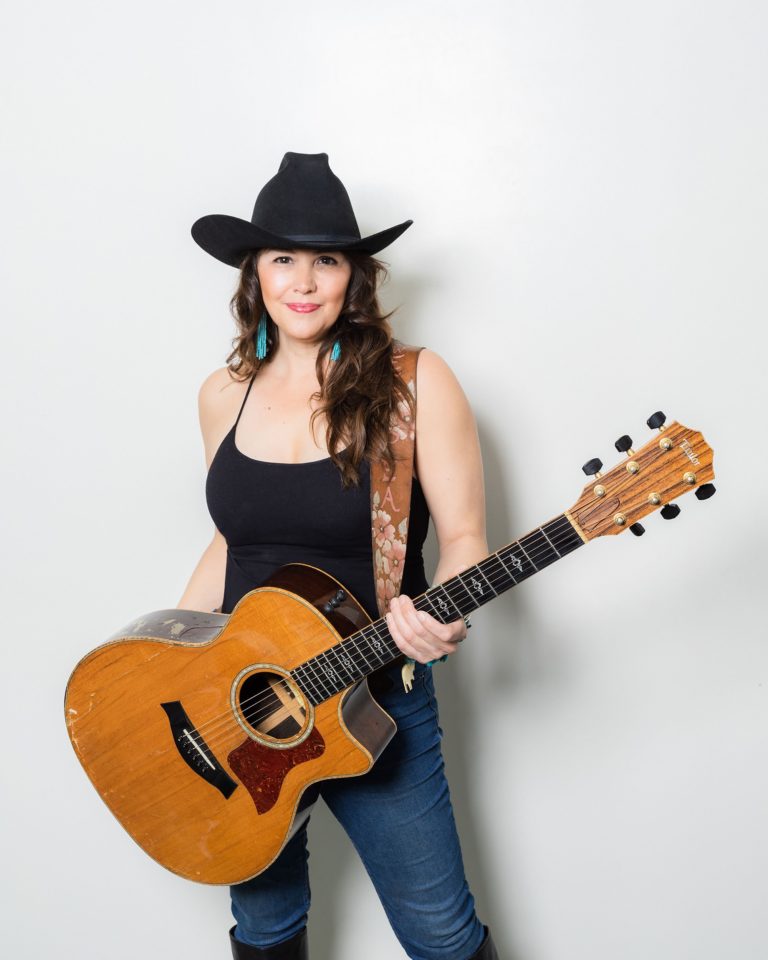An outlaw country headliner whose music reaches far beyond the genre’s borders, Sara Petite has built an award-winning career with songs that owe as much to the rock & roll roadhouse as they do the honky-tonk.
Hers is a raw, rough-edged version of American roots music, delivered by a five-time International Songwriting Competition finalist who’s spent nearly two decades calling her own shots. Sara has no interest in chasing trends. She’s too busy chasing the muse instead, earning a wide range of accolades — including Top 40 success on the Americana charts, international airplay, and more than a half-dozen trophies from the San Diego Music Awards — along the way.
“When I first began playing shows, people used to tell me ‘You’ve gotta pick a sound,'” she remembers. “I didn’t like that advice. I like to do things my way, and that means going all over the map, from country to rock & roll to soul to punk. This music is my own, after all. It should sound like me.”
The Empress, her seventh record, marks a return to the intersection of country twang and roots-rock bang. It’s a place Sara knows well, and she sketches its dimensions in sharp detail. These 11 songs take place in dive bars, trailer parks, the throes of passion, and the feedback loop of addiction, with Sara embodying her characters fully. From the heartbroken narrator of “The Mistress” — an old-school country/soul ballad about a lover’s affair with alcohol, punctuated by pedal steel and electric piano — to the hell-raising hillbilly heroine of “Bringin’ Down the Neighborhood,” she maintains a strong female perspective, celebrating the full range of womanhood along the way. The Empress is an album for all genders, stocked with songs that tackle the universal struggles we all face. Even so, its central heroes are Joan of Arc, Mary Magdalene, and other woman who, like Sara, have pushed against imbalances in society for the sake of fairness.
“‘The Empress’ comes from the idea that our world is out of balance,” she says of the album’s anthemic title track, which salutes the empowered rule-breakers of the past with fiddle and galloping drums. “Everything’s gone off-kilter, and we all need that mix of feminine and masculine energies in our bodies. The more that women are respected and held to the same level of importance as men, the better off we’re all going to be. On this album, I’m not writing about misogyny as much as I’m writing about my own life and the strong women I see in my world.”
Produced by Grammy nominee Eric Corne, The Empress crackles with the energy of a live band whose performances match the material’s unique punch. “Sara is an incredible lyricist and embodies her characters like a method actor,” says Corne, who recorded the bulk of the album during a pair of inspired weekends. “She’s also one of those rare singers that can pull off a song often in 1 or 2 takes. She deals with real emotions, real stories, real feelings. It’s easy to understand why great musicians adore her and want to play with her, like piano player and violinist Bobby Furgo, who played with Leonard Cohen, and bass player Jorge Calderón, who worked with Cohen and Warren Zevon. They’re the real deal, and so is she.”
With a voice that swoons one minute and snarls the next, Sara charges her way through The Empress like outlaw country royalty. “God Save the Queen,” a Rolling Stones-sized rocker that kicks off the album, finds her singing about Mother Earth. “Take care of me; I am your home,” she demands during the song’s final moments, while stomping drums underscore her urgency. She reevaluates the Adam and Eve story with the greasy raunch of “Forbidden Fruit” — “Let’s head east of Eden / Ain’t the Garden, but it’s nice / Cut them apron strings / Let’s start our own Paradise,” she sings — and even slips into French during the country-fried Cajun track “Le Petit Saboteur.”
For the album’s two-part closer, Sara revisits “Lead the Parade” — a song that first appeared in 2008, back when it served as the bluegrass title track of her sophomore album — and slows the tempo to an elegant shuffle, turning the track into a New Orleans funeral procession. “Now here I am with a rose in my hand / All dressed up to go away / This ain’t no rehearsal; it’s the real thing today / So driver, let the hearse lead way,” she sings, backed by fiddle and upright piano. The reimagined song then gives way to “Meet Me on the Other Side,” a gospel rave-up that blends the energy of Saturday night with the emotional uplift of Sunday morning. Here, the mood is far more celebratory than crestfallen, with Petite asking the departed to “bring your dancing shoes and happy feet / ‘Cause that’s the day our souls will meet / When I meet you on the other side.”
Released on the heels of Rare Bird, The Empress shines new light on a singer/songwriter who grew up in a tulip farming town in rural Washington, launched her career after moving to southern California, and continues to perform on both sides of the Atlantic. It’s a rawly-refined record that’s every bit as diverse as Sara herself, with songs rooted in history and experience. “I’m an ever-evolving person who refuses to stay the same, and The Empress reflects that,” she says. “My work is very personal, so this record is me — a securely insecure, confidently unconfident person who’s learned to be comfortable with the in-between.”

